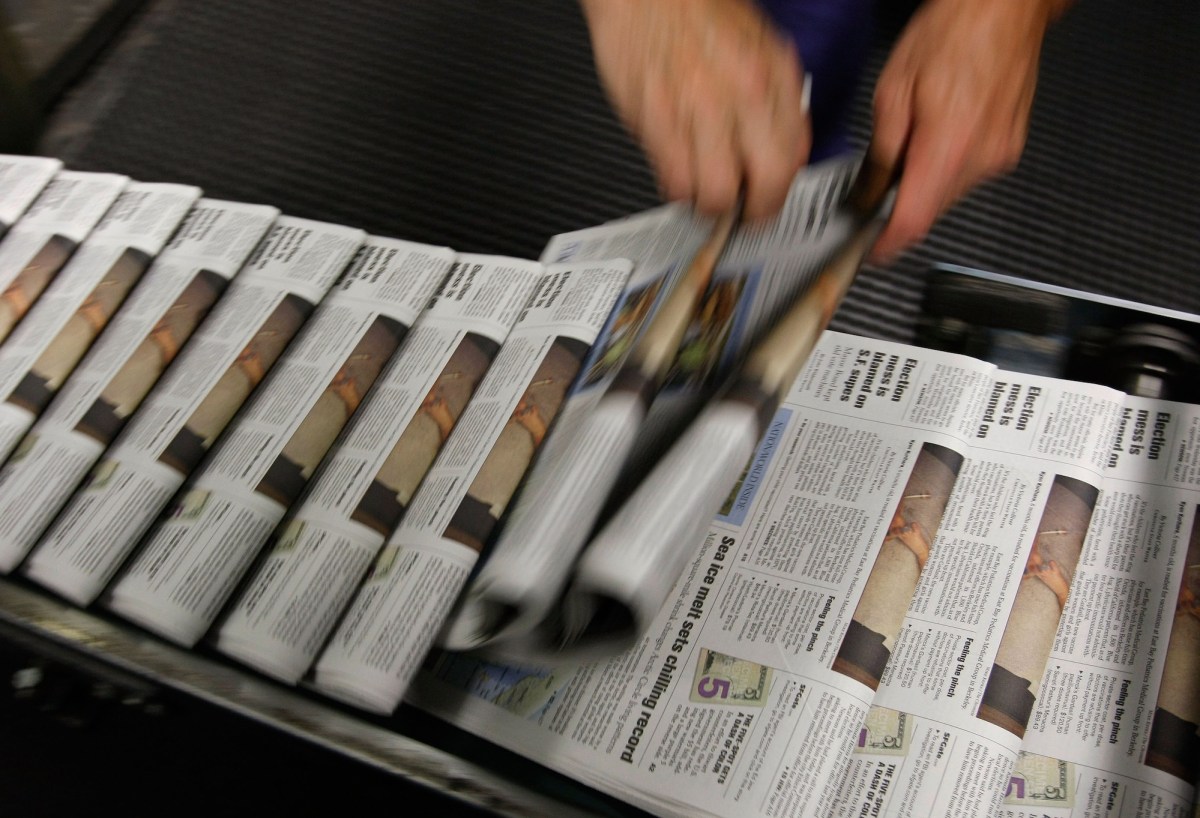Employers like Ben & Jerry’s must help create real first chances to prevent incarceration
In April, it was heartening to hear President Biden announce new efforts to help dismantle the unnecessary barriers currently facing 70 million Americans with criminal records. For one in three U.S. adults, having a record severely limits economic opportunity. The unemployment rate for formerly-incarcerated people is 27%—higher than the overall U.S. rate at any point in history. When these individuals do find jobs, they’re significantly more likely to be low paying. The damage can also be lifelong—one study found that first-time incarceration reduced lifetime earnings by more than 30%. These barriers are disproportionately felt by people of color. Black Americans are incarcerated at nearly five times the rate of whites, and the impact of a criminal record on employment is significantly higher for people of color. One in four Black men born in the U.S. today can expect to spend some time in prison. As a result, they have one of the lowest labor force participation rates in the country. Confronting the economic immobility inflicted by our justice system is critical in the fight for racial equity in America. The importance of ongoing efforts to tackle this crisis cannot be overstated. Employers have made major strides in expanding second-chance hiring, and lawmakers from Pennsylvania to Utah have passed Clean Slate legislation to automatically seal certain criminal records after a period of time. While these solutions mark a significant step forward, they are concentrated on supporting adults after incarceration. We also have to prevent people from falling into the justice system in the first place. Access to a good job is one of the most critical factors in determining who winds up behind bars. This is best illustrated by the recidivism rates for those who find gainful employment after release versus those who do not. Employers can provide those jobs and use recruitment in an intentional way to prevent justice-system involvement before it starts. That’s why the Responsible Business Initiative for Justice and Ben & Jerry’s are working with partners to build a new employment program that focuses on “first-chance hiring”—called Unlock Potential—that will deliver meaningful career opportunities to those people who are the most likely to end up in our prisons and jails. The pilot program will launch in a handful of Ben & Jerry’s franchised scoop shops later this year. But who are the people who are most at risk? The United States is home to more than four million “disconnected youth”: young people ages 16 to 24 who are neither in education nor employment. These individuals are five times more likely to have a criminal record than their peers. Additional factors, like experiencing human trafficking, a juvenile arrest, aging out of foster care, or having an incarcerated parent, serve to compound that risk of justice system involvement. We must find ways to increase the positive life choices open to these young people. Early employment—in ice cream and beyond—can set them on the right path for a lifetime of success. Preventing this group from becoming economically disenfranchised by the justice system will have a tremendous impact on racial equity. Ninety one percent of disconnected youth are BIPOC; youth of color represent 28% of the U.S. population, but 67% of offenders in residential placement. Black and Latino youth are up to six times more likely to be disconnected than white youth. Engaging this group should be mission-critical to all employers. Last Wednesday marked two years since the murder of George Floyd, and since that tragedy, our country has rightly faced a racial justice reckoning. Companies large and small publicly committed to step up their efforts to fight systemic discrimination and to expand diversity across their organizations—from the mail room to the boardroom. Now they must walk their talk. First-chance hiring programs like Unlock Potential will not only build more equitable communities, but will also allow businesses to maximize the potential of a vast, diverse, and underutilized talent pool. It is one we need, now more than ever. Last year, the United States recorded more than 11.1 million job vacancies, a number that has continued to grow. By providing hands-on experience in a small business, we hope the program can inspire an entrepreneurial spirit in its participants, and provide them with the diverse range of skills, backgrounds, and perspectives necessary to thrive as future small business owners themselves. In April, our country rightly emphasized the paramount importance of second chances. But if we are going to disrupt the intergenerational cycles of poverty and incarceration that devastate our communities, we need to be providing real first chances. It is only by helping to prevent justice-system involvement, and disrupting the prison pipeline, that we can tackle the racial inequity and economic immobility it creates. The business community has an obligation to meet workforce demand

In April, it was heartening to hear President Biden announce new efforts to help dismantle the unnecessary barriers currently facing 70 million Americans with criminal records. For one in three U.S. adults, having a record severely limits economic opportunity. The unemployment rate for formerly-incarcerated people is 27%—higher than the overall U.S. rate at any point in history. When these individuals do find jobs, they’re significantly more likely to be low paying. The damage can also be lifelong—one study found that first-time incarceration reduced lifetime earnings by more than 30%.
These barriers are disproportionately felt by people of color. Black Americans are incarcerated at nearly five times the rate of whites, and the impact of a criminal record on employment is significantly higher for people of color. One in four Black men born in the U.S. today can expect to spend some time in prison. As a result, they have one of the lowest labor force participation rates in the country. Confronting the economic immobility inflicted by our justice system is critical in the fight for racial equity in America.
The importance of ongoing efforts to tackle this crisis cannot be overstated. Employers have made major strides in expanding second-chance hiring, and lawmakers from Pennsylvania to Utah have passed Clean Slate legislation to automatically seal certain criminal records after a period of time. While these solutions mark a significant step forward, they are concentrated on supporting adults after incarceration. We also have to prevent people from falling into the justice system in the first place.
Access to a good job is one of the most critical factors in determining who winds up behind bars. This is best illustrated by the recidivism rates for those who find gainful employment after release versus those who do not. Employers can provide those jobs and use recruitment in an intentional way to prevent justice-system involvement before it starts. That’s why the Responsible Business Initiative for Justice and Ben & Jerry’s are working with partners to build a new employment program that focuses on “first-chance hiring”—called Unlock Potential—that will deliver meaningful career opportunities to those people who are the most likely to end up in our prisons and jails. The pilot program will launch in a handful of Ben & Jerry’s franchised scoop shops later this year.
But who are the people who are most at risk? The United States is home to more than four million “disconnected youth”: young people ages 16 to 24 who are neither in education nor employment. These individuals are five times more likely to have a criminal record than their peers. Additional factors, like experiencing human trafficking, a juvenile arrest, aging out of foster care, or having an incarcerated parent, serve to compound that risk of justice system involvement. We must find ways to increase the positive life choices open to these young people. Early employment—in ice cream and beyond—can set them on the right path for a lifetime of success.
Preventing this group from becoming economically disenfranchised by the justice system will have a tremendous impact on racial equity. Ninety one percent of disconnected youth are BIPOC; youth of color represent 28% of the U.S. population, but 67% of offenders in residential placement. Black and Latino youth are up to six times more likely to be disconnected than white youth.
Engaging this group should be mission-critical to all employers. Last Wednesday marked two years since the murder of George Floyd, and since that tragedy, our country has rightly faced a racial justice reckoning. Companies large and small publicly committed to step up their efforts to fight systemic discrimination and to expand diversity across their organizations—from the mail room to the boardroom. Now they must walk their talk.
First-chance hiring programs like Unlock Potential will not only build more equitable communities, but will also allow businesses to maximize the potential of a vast, diverse, and underutilized talent pool. It is one we need, now more than ever. Last year, the United States recorded more than 11.1 million job vacancies, a number that has continued to grow.
By providing hands-on experience in a small business, we hope the program can inspire an entrepreneurial spirit in its participants, and provide them with the diverse range of skills, backgrounds, and perspectives necessary to thrive as future small business owners themselves.
In April, our country rightly emphasized the paramount importance of second chances. But if we are going to disrupt the intergenerational cycles of poverty and incarceration that devastate our communities, we need to be providing real first chances. It is only by helping to prevent justice-system involvement, and disrupting the prison pipeline, that we can tackle the racial inequity and economic immobility it creates. The business community has an obligation to meet workforce demand, to invest in future leadership, and to make their communities safer, fairer and more equitable. First-chance hiring can do all three.
Matthew McCarthy is the CEO of Ben & Jerry’s, and Celia Ouellette is the CEO of Responsible Business Initiative for Justice.






















